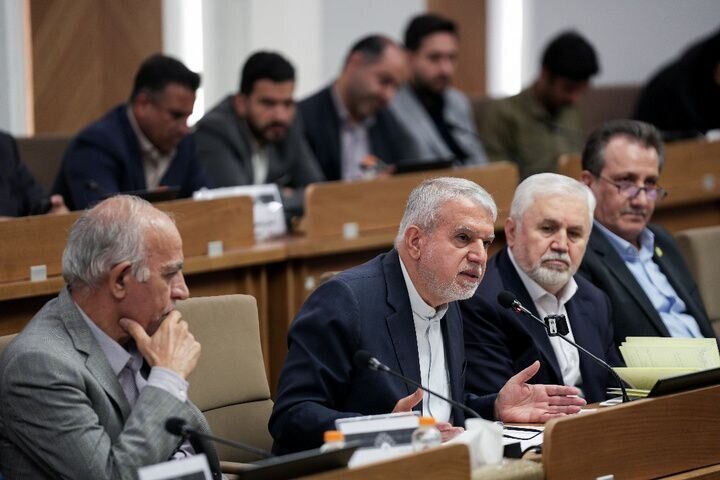Salehi-Amiri: Iran's future development will pass through the sea-based economy

TEHRAN — Iran's future development will pass through the sea-based economy, said Minister of Cultural Heritage Reza Salehi-Amiri.
Speaking at a joint gathering to coordinate the implementation of general policies for sea-based development, attended by the representative of the Iranian President and the governors of the country's coastal provinces on Monday, he emphasized the strategic importance of the coasts in Iran's economic future, IRNA reported.
With a strategic perspective, the government has made the transformation of the coastal provinces one of the main axes of the national development plan, he said.
“National development is not possible without paying attention to the sea. Today, all parts of the government believe that the future of Iran depends on the development of the country's northern and southern coasts.”
He said that the government's plan is based on balanced development, focusing on local capacities and creating sustainable employment in coastal provinces. The sea is not only an opportunity for Iran but also a civilizational advantage that must be exploited with careful planning and a national perspective, he added.
Referring to the low share of marine tourism in the country's economy, he stated that while in many developed countries about 30 percent of tourism income is obtained from the sea, Iran's share is still less than two percent. “This indicator must be improved, and we have developed a comprehensive plan for it that includes both the coastal areas and islands of the country.”
Salehi-Amiri pointed to the necessity of forming mixed tourism in the country and said: “Iran is an exceptional country that encompasses everything from the sea to the forest and desert. Our planning for the development of mixed tourism is based on nature and culture.”
Emphasizing the government's development-oriented approach to tourism, he added that the government has purposefully increased financial resources for the tourism sector, including allocating $340 million to complete more than 2,700 unfinished projects across the country.
These resources are provided by the Central Bank of Iran, the National Development Fund, and the banking network and are made available to the provinces' priority projects, he said.
Stating that tourism is one of the main pillars of the country's non-oil economy, he noted that last year, $25 million in facilities were provided in this sector, and this year the figure has increased. This trend shows that the government's view of tourism is strategic and forward-looking, he added.
Referring to the supportive plans for handicraft and ecotourism activists, the minister said that, in a memorandum of understanding with the Mostazafan Foundation, special facilities have been planned for 17,500 handicraft units and ecotourism resorts, which will provide employment for more than 26,000 people.
Emphasizing the need to form a coherent structure in the development of coastal tourism, he stated: “To achieve the goals of sea-oriented development, we must consider three principles: first, special attention to environmental requirements; second, providing long-term facilities to attract investors; and third, cooperation between agencies. Coordination between ministries and governorates guarantees the realization of this path.”
Referring to the unique potential of coastal provinces, Salehi-Amiri said: “The regions of Makran, Chabahar, Hormozgan, Bushehr, and Khuzestan can each become major tourism and economic hubs of the country. From the civilization of Chogha Zanbil in Khuzestan to the pristine beaches of Makran, from the beautiful islands of the Persian Gulf to the Caspian forests — all these are potentials that must be transformed into national opportunities within the framework of a coherent program.”
Ali Abdolalizadeh, the President’s Representative for the Coordination of the Implementation of General Policies for Maritime Development, also emphasized that development is the foundation of efficient governance and added that countries that face challenges in their progress lag behind not because of a lack of capital but because of weaknesses in institution building. “In the past year that I have been in charge of maritime development, I have realized the importance of institution building more than anything else, because the value of institution building is greater than any tangible investment.”
He clarified: “The first regulation that we developed in the Maritime Development Secretariat was related to the separation of ships and vessels in order to systematically resolve existing differences between executive agencies. This measure was an important step toward establishing administrative and technical discipline in the maritime domain.”
Emphasizing the need to create coordination between agencies in the development path, he said: “More than 30 agencies are active in the field of transportation and marine tourism. Our goal is to create an institutional link between these agencies.”
Abdolalizadeh added: “To prevent the dispersion and overlap of activities on the Makran coast, we have initiated two fundamental steps: first, drafting regulations for the construction and operation of marinas, and second, designing marine tourism corridors along with special logistics regulations. These measures will lay the foundation for a new order in marine-based tourism management.”
Referring to the unique natural resources on the southern coast of the country, he continued: “There are unique areas on the Makran coast, such as ‘Gel Feshan,’ that have not yet been officially registered and documented. These areas are Iran's natural heritage and should be recognized and protected as part of the national assets.”
He added that the natural beauty of the Makran coast and the Persian Gulf islands is part of Iran's cultural and natural identity. “In planning, we must redefine the concept of the coast scientifically to prevent any non-expert intervention. Any development action on the coast must be carried out in compliance with environmental requirements and respect for nature.”
Emphasizing the need to pay attention to the natural and cultural beauties of Makran, he stated that Makran is a symbol of the natural beauty and pristine tourism capacities of Iran.
“These opportunities should not be ignored. Any action that can help strengthen Makran's position in national development should be pursued seriously.”
KD
Leave a Comment